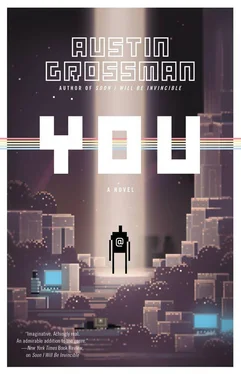“Yeah, so I’m going to bed, Brennan. I have to work tomorrow. I can’t just ride around looking for loose gold, like you. I have to go to work every day.”
“In sooth, thy life sounds passing strange and shitty.”
“Yeah, it sucks,” I said, climbing the stairs to my apartment. “I’d rather be you.”
“In sooth, my life is kind of better than yours. Maybe you should play more video games.”
“Aye,” I said.
Imade sure to be in the office by nine fifteen on Tuesday morning for the ten o’clock leads meeting. On my way in, Holly, the receptionist, smiled and congratulated me, then Roger in QA waved to me in a low-key but cheery way. I sat down at my computer and there it was, a company-wide e-mail about the restructuring:
We are happy to announce that Russell will be stepping up for us as lead designer for Realms of Gold VII . Gabby will stay on as art lead. Lisa will fill in as lead programmer.
Peter and Jared came in together around nine forty-five—they were roommates—and my skin prickled as I sat rigid in my chair and waited for them to sit down and get the news. Should I have met them as they came in and greeted them with the news? I’d hoped they would come in later—I wanted to meet them coming out of that meeting, after they’d had time to adjust to the news.
I strained to hear a reaction. I think I caught a whispered “No way!” I knew I was going to look weirder and weirder just sitting there and not saying anything, so I went around for a low-key hello. Jared and Peter shared a table side by side, among a tangle of cables and action figures (ironic? I never knew) and Jared’s trackball, which he brought from home and insisted on using instead of a mouse. I hate going to see people at their desks, because they’re always facing away from you and you have to figure out how to get their attention, but this time Peter was perched on one of the desks and could say “Hey” to get things started. They were—how did this happen without me?—cool. They had actually competed to get into the industry instead of retreating there because no place else would take them.
They went out and (I assumed) hooked up with girls. For them, a video game job was a little like a job in film. It was actually, sincerely, cool. “So you got the e-mail?” I said. It was, in fact, up on Jared’s screen. “Yeah, congratulations, man,” Jared said, while Peter came up with some combination of “Totally cool!” and “Yeah!”
“So we’ll meet, like, eleven thirty after leads and go through some stuff,” I said abruptly. I didn’t know why eleven thirty.
Nobody had anything to do that day, and I had my first realization about management, which was that a big part of the responsibility is making sure everyone under you has something to do every second of the day.
“Right, right.”
I added, “Okay, cool. See you then.” I left them with this sparkling witticism. Troops rallied.
The leads meetings were a daily status update where the heads of different disciplines reported on progress and exchanged information. For the most part, Black Arts had a non- or antihierarchical ethos, but there were limits. The conference room was always freezing for some reason. I had only been in there for company-wide meetings, where we all crammed in and stood against the walls, or for the occasional office party, or because it was the only place to make a private phone call.
We were a revised and reconstituted Black Arts, headed by me and Lisa and Don, the old second-string players. Genius had left the building. There had been a couple of summary resignations since Darren’s announcement, and the vacant tracts of third-floor land encroached still further on our cubicle village. Lisa was the only person there.
“Hi,” she said. She looked tired.
“Hey. Congratulations.”
“It’s not that much of an honor,” she said. “Just seniority. Everyone here now is leftovers. Producers, a couple of level designers, journeyman programmers.”
“So, ah, how come you didn’t go with them?”
“Nobody asked. I’m a tools programmer; it’s not sexy. Plus, Darren’s guys, they’re kind of… assholes. I’m not sure I would have gone even if they asked me. I know them pretty well.”
“So… what exactly do you do here now?” I asked.
“Rendering and lead,” she said. She was doing her best to hide it, but for the first time since I could remember she may actually have looked pleased. “Our deal with NVIDIA is toast, obviously. I have a Quake -style renderer I’ve been doing in my spare time. We shouldn’t have to change the data scheme radically from what we had, so we’re going to see what it can do.”
“Did you write the renderer for the last one?” I asked, wondering what the words spare time meant to her.
“Some asshole in Ukraine did it. We bought it through the mail. Women don’t write renderers, not on Darren’s team, anyway,” she said, and underneath the blanked-out affect I felt just a hint of her bitterness. “Not anywhere, really. This one’s going to be first on a triple-A game.”
Black Arts was already starting to look different to me now that I was a leading player. It had its own rules and character classes that I needed to know. I realized it as Gabby, the lead artist, came in—I still didn’t know anything about her other than that she was tall and bony with frizzed red hair, and that she was supercompetent. She wore jeans and a tank top and generally had more color than the average BA drone. Artists in a game studio are their own species. They produce the showy graphics that are the only things game publishers care about. They are all, on average, cooler and sexier than the usual employee, which is also a mystery, since the last time this class of people were seen they were drawing dragons on the backs of their notebooks in biology class. Four years later, they would come back from art school with different clothes and an attitude that told you they were only here because they had to be, which was probably true.
Gabby ran the art department as a fairly closed shop; which was okay with Don because it was also the only department that was reliably on schedule. I could see it was going to be embarrassing to have to go stand over her at her desk and explain why the green dragon couldn’t be breathing fire on the cover of the manual because, “Um in Realms um green dragons only breathe poison gas um it would have to be red it’s just what the rules say.”
And then, Lisa. I didn’t understand all of what programmers did, but as a game designer I knew I would have to talk to them. I was starting to divide programmers into two categories according to the two basic ways they accommodated their personalities to the weirdness of having to invest a massive cognitive load into an invisible, inhumanly intricate rule-based system that functioned on many, many levels of abstraction. To appear normal even though they spent their lives in a dark empire of strict and arbitrary rulings.
First, there are the ones who try to normalize it. They make an effort to show that this is just a regular job to them; they have pictures of basketball players and racing cars, and whatever else normative adults post, in their cubicle. They go home at five thirty in the afternoon; they’re good at scheduling, and always deliver product to spec and on time. They are typically very average programmers and mediocre-to-poor conversationalists. They simply choose not to look into the dark cognitive mirror of the machine.
Then there are the ones who in some way let themselves invest in what they’ve taken on, give a core part of their personalities to it, and embrace the damage that results. It comes with an inward depressive streak. The world of the compiler is an extension of the cursed, Chekhovian world they already live in, with the same mocking sense of humor and dour Slavic fatedness. When the world goes right, when the code compiles, it’s a brief, anomalous suspension of the rules.
Читать дальше





![Ally Carter - [Gallagher Girls 01] I'd Tell You I Love You But Then I'd Have to Kill You](/books/262179/ally-carter-gallagher-girls-01-i-d-tell-you-i-lo-thumb.webp)






